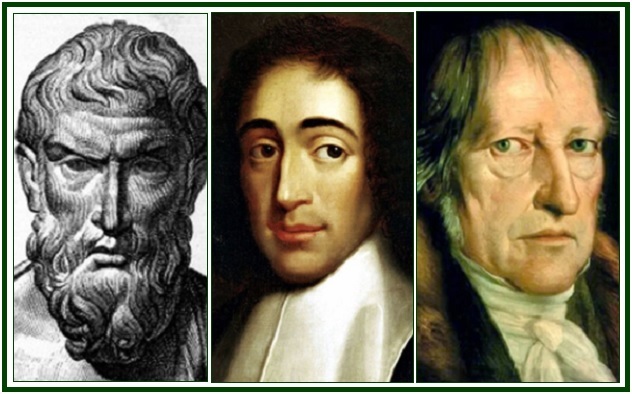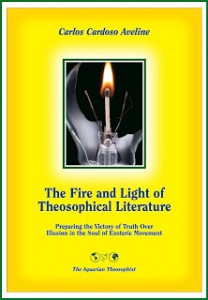
An Unfinished Manuscript on the
Theosophy of Western Philosophers
Helena P. Blavatsky

Epicurus of Samos, Baruch Spinoza and G.W.F. Hegel
000000000000000000000000000000000000000000
Editorial Note:
The following text is reproduced from volume
XIII of the Collected Writings of HPB, pp. 307-312.
Editor Boris de Zirkoff writes in an opening note:
“The Manuscript of this unfinished essay in H.P.B.’s
handwriting exists in the Adyar Archives. It has been
originally published in The Theosophist, April, 1962, pp. 8-13.”
The article was also published at the November
2015 edition of “The Aquarian Theosophist”, pp. 15-18.
(Carlos Cardoso Aveline)
00000000000000000000000000000000000000000000000000000
One of the greatest materialists that ever lived, and than whom no one adduced stronger arguments in defence of his theory – was Epicurus. The great, the virtuous, the noble and chaste Epicurus, who called the higher ends and divine laws mere inventions of the human mind, and rejected the idea of the human Soul as being immortal. Who of our modern positivists has ever said of the origin of our being, anything stronger than this:
“The soul……. must be material, because we trace it issuing from a material source; because it exists, and exists alone, in a material system; is nourished by material food; grows with the growth of the body; becomes matured with its maturity; declines with its decay; and hence, whether belonging to man or brute must die with its death.” [1]
And yet, he was a Deist and a Theosophist; for apart from a system entirely his own, the profound philosophy of which is evinced in the cohesive power of his school never equalled by any other ancient school of philosophy – he devoted his whole life to the study of natural sciences and the analysis of divine action in its relations to nature. His conclusion was that the Universe which is infinite could not be the product of divine action, since the existence of evil cannot be accounted for. Notwithstanding this, and though disbelieving in a God as an intelligent Principle, he admitted the existence of both a Supreme Being and gods or Spirits, living and immortal beings, of human shape but colossal proportions.
On the other hand, Spinoza was a recognized “systematic Atheist” as Bayle brands him [2]; against whom was pronounced the terrific Anathema Maranatha, and whose system of negation Malebranche terms a chimera both ridiculous and terrible. And yet, no more refined, spiritual nature than Spinoza’s ever breathed upon earth. If by Epicurus abstract ideas were continually transformed into the gross concrete forms of a material Universe; by Spinoza the material conceptions of Science, from the Solar system down to the molecular structure of a leaflet, were mellowed down to the most Raphaelic hues, and the grossest substances assumed the shadowy, ethereal outlines of an ideal world. So much did this martyr of transcendent Theosophy impress himself upon the subsequent generations of thinkers that Schleiermacher speaking of “the holy but proscribed Spinoza” reaches the most touching pathos. “The Divine Spirit transfuses him”, he says. “The infinite was his beginning and end, the universe was his only and everlasting love. In holy innocence and deep humility he mirrored himself in the eternal world, and saw also how he was its noblest mirror. Full of religion was he, and full of a holy spirit, and therefore he stands alone and unrivalled, master of his art, but exalted above profane Society, without disciples and without even citizenship!” [3]
The conceptions of this “atheistical” Theosophist, about God are among the most original. Iron-bound as they are by the law of necessity reigning everywhere in physical nature, we find him solving the most abstract ideas by rigidly geometrical definitions. His is a system of metaphysical ideas from which evolve a series of theorems – a demonstration from the eight definitions and seven axioms of the first book of the Ethica. [4]
One acquainted with the Hindu philosophy would be singularly reminded of both the Vedanta and that extreme Buddhist system known as the school of the Svâbhâvikas. According to his ideas God is “a Substance consisting of infinite attributes each of which expresses an absolutely infinite and eternal essence.” It follows that this Substance – necessary and infinite, one and indivisible, is God, the only Self-existence, All-Perfection and absolute Infinitude. Take away the name of the Deity, and you have here the abstract ideas about the only creative Power of the World, of the Svâbhâvikas. “Nothing exists in the Universe but Substance – or Nature”, say the latter. “This Substance exists by, and through itself (Svabhavat) having never been either created or had a Creator.” “No” – echoes unconsciously Spinoza, “nothing exists in this world but Substance, and the modes of its attributes; and, as Substance cannot produce Substance there is no such thing as Creation.” This is the claim of most of the Hindu philosophies. And again ……. It (creation) – says Spinoza, has no beginning and no end, but all things have to proceed or emanate from the Infinite One and will so proceed eternally. According to his philosophy, only two out of the innumerable infinite attributes of the Deity are known to us – extension and thought, the objective and the subjective of which He (the Infinite) is the identity. God is the only free Cause (causa libera), all other beings having neither free will nor contingency are moved by fixed laws of causation. The Deity is “The causa immanens omnium, not existing apart from the Universe, but manifested and expressed in it, as in a living garment.” In the Zohar the creation or universe is also called “the garment of God” woven from its own Substance.
’Tis thus at the roaring Loom of Time I ply
And weave for God the garment thou seest Him by,
says Goethe, another German Theosophist in his Faust. And, in Vedanta, we find Brahma the Absolute God, unconscious of the Universe, and remaining ever independent of all direct relation to it. Says Pandit Pramadâ Dâsa Mittra of Benares – in his Vedântic Conception of Brahma: “While the Vedântin denies this mundane transitory consciousness to the Deity he declares …….. emphatically ……. that He is Consciousness Absolute ……. He and His Consciousness are not distinct ……. It is this permanent Self partially manifested [in man,] but prevailing all conscious beings that is the Omnipresent Spirit ……. The Vedântin believes that it (the world) was nothing and is nothing apart from the One absolute Being – God.” [5] It is only when the Jewish philosopher speaks of the “attributes” of God – however infinite, that he differs from the Vedanta; for the latter allows man alone to call his consciousness an attribute of his soul “because it varies, whilst the consciousness (chaitanya) of God is one and unchangeable, hence no such distinction of substance and attribute holds with Him.” As to Spinoza’s Deity – natura naturans – conceived in his attributes simply and alone; and the same Deity – as natura naturata or as conceived in the endless series of modifications or correlations, the direct outflowing results from the properties of these attributes, it is the Vedantic Deity pure and simple. The same subtle metaphysical distinction is found in the mystery by which the impersonal Brahma – One and Indivisible, the Absolute “consciousness” – unconscious of the Universe, becomes through sheer metaphysical necessity Ishvara, the personal God, and brings himself into direct relation to the Universe – of which it is the Creator – respectively under the definitions of Maya (illusion), Shakti (power) and Prakriti (nature).
So pre-eminent is the Vedantic Brahmâ-Ishvara in Spinoza’s philosophy that we find this idea strongly colouring the subsequent views of Hegel, one of the philosophers who was the most influenced by the Jewish idealist. In the Hegelian scheme the Absolute asserts its rights to the fullest extent. Hegel declares that he would rather deny the existence of the material universe than to identify God with it. Fichte whose transcendental idealism was originally intended to amplify that of Kant, and served as a basis for Schelling’s Nature-philosophy had gone still further than Hegel in that direction. Unable to free human will from subjection to the iron laws ruling despotically all over physical nature, he denied the reality of both nature and law and denounced them as the product of his own mind – (maya?). Hence he denied God, for in his philosophy the Deity is not an individual being but merely a manifestation of Supreme laws, the necessary and logical order of things, the ordo ordinans of the Universe. If we take in consideration that by a peculiar modification of language, that which the ancients called “Substance”, modern philosophy terms as the Absolute, or the Ego, we will find still more striking similarities between the pantheistical mysticism of the ancients and the extreme transcendentalism of today, whether in physical or spiritual sciences.
To sum up, then, whether with Robert Boyle one considers the Universe in the light of a gigantic clock-work and strives to fathom the mystery of that Self-existing Key, which winds it up so periodically and mechanically. Or, belonging to the class of those thinkers, whom the Duke of Argyll accused in his Reign of Law [6] of constantly speaking of “mere ticketing and orderly assortment of external facts”, and is a Positivist. Or again maintains with Dr. Tyndall that “the order and energy of the Universe is inherent and not imposed from without, – the expression of fixed law and not of arbitrary will”, and is regarded as a materialist. Or yet, without being necessarily a Sectarian bigot, he reflects the early teachings of his childhood and regards God as a tangible, gigantic operative and intelligent Being, with personal attributes, who descends periodically into various Avataras, becomes a “divine male” like Viraj and others, and rejects a deity incomprehensible and incomprehensive – an invisible mist. Or following in the footsteps of the ancient Yogis, starts out in search of the Boundless and the Unconditioned One, and hopes of meeting face to face the Absolute and Subjective, or believes in Alchemy and expects to rival Raymond Lully in the art of making gold and finding the philosopher’s stone; or finally, like Iamblichus, or a modern Spiritualist, experiments in Theurgy and Spiritualism, and calls out forth superior and inferior spirits from the supermundane spheres …….
(The manuscript is interrupted at this point.)
NOTES:
[1] Note by B. Zirkoff: “This is probably H.P.B.’s own translation from the Greek. A summary of the thought of Epicurus on the Soul is translated in the Loeb Classical Library edition of Diogenes Laertius’, Lives of Eminent Philosophers, Vol. II, Book X, § 63-68.”
[2] Note by B. Zirkoff: “See Bayle en Spinoza….. Leiden, E. J. Brill, 1961; also Latin ed. of Pierre Poiret: Cogitationum Rationalium…. pp. 80, 87, 304-305. Joannem Pauli, Amsterdam, 1715.”
[3] Note by B. Zirkoff: “Schleiermacher, Friedrich, Speech 2 (‘Nature of Religion’) in his work On Religion, N.Y., Harper Bros., 1958, p. 40 of Eng. repr.”
[4] Note by B. Zirkoff: “Many editions. H.P.B. may have consulted The Chief Works of Spinoza, by R. H. M. Elwes (2 v.) Bohn’s Lib. ed., London, George Bell & Sons, 1883, or W. H. White’s Trans. of Ethics in the same year.”
[5] Note by B. de Zirkoff: “A Dialogue on the Vedantic Conception of Brahma, Journal of the Royal Asiatic Society, 2nd series, Vol. X, Pt. 1, 1877; see pp. 35 & 36.”
[6] Note by B. de Zirkoff: “The 8th Duke of Argyll is actually George Douglas Campbell. See New York edition of 1888.”
000
On the role of the esoteric movement in the ethical awakening of mankind during the 21st century, see the book “The Fire and Light of Theosophical Literature”, by Carlos Cardoso Aveline.

Published in 2013 by The Aquarian Theosophist, the volume has 255 pages and can be obtained through Amazon Books.
000